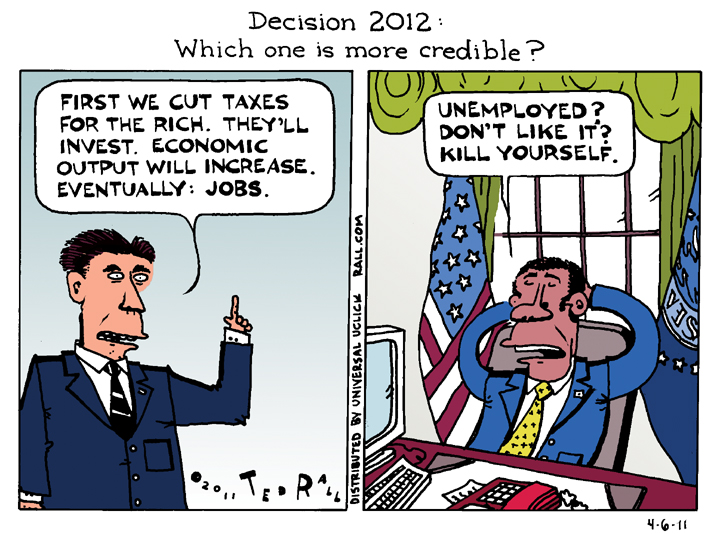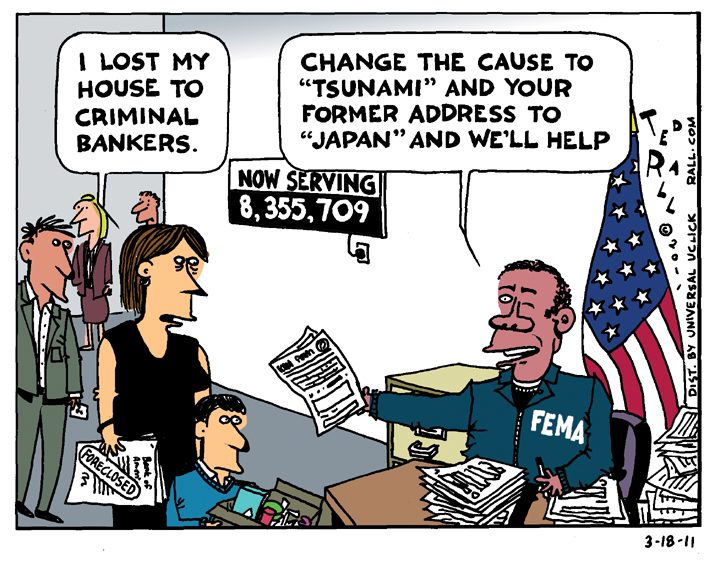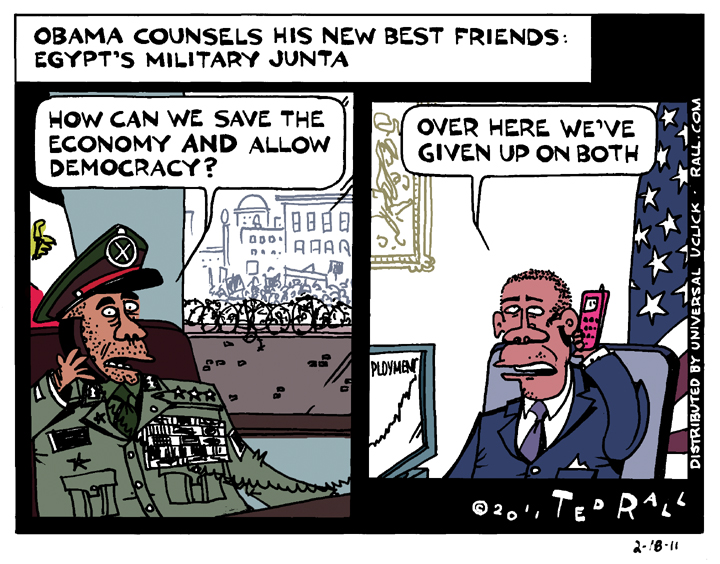If The Kiss famously caught by a photographer on V-J Day in Times Square happened today, it might look and feel different. The death of Osama bin Laden does nothing to ease the economic pain of depression and collapse.
SYNDICATED COLUMN: Zero Salary for Congress
Why Not Link Pols’ Pay Level to Ours?
Most Americans don’t like Moammar Kadafi or Mahmoud Ahmedinejad. But that might change if they knew their paychecks. The leaders of Libya and Iran get $9,516 and $3,000 a year annually, respectively.
Obama collects $5,505,509—a whopping $22,022 per day.
Who’s the real out-of-touch dictator?
As the U.S. enters its third year of economic collapse, real unemployment has surged past levels that triggered revolts in Tunisia and Egypt. Yet neither the President nor members of Congress seem worried. They’re not even discussing the possibility of a bailout for the one-third of the workforce that is in effect structurally unemployed. Do you wonder why?
Maybe they don’t know what’s going on. As the saying goes, it’s a recession when you’ve gotten laid off. For members of Congress, who are raking it in, these are boom times.
Congressmen and Senators are insulated by huge salaries—$174,000 and up—that put them out of touch with and unaware of the problems of the 97 percent of Americans who earn less. Out of 535 members of Congress, 261 are millionaires.
It can’t be easy for Senator Dianne Feinstein, Democrat of California, to feel our pain. According to campaign disclosure documents filed in 2010, her net worth is somewhere between $46 million and $108.1 million—and she’s only the 10th richest member of Congress. The top honor goes to Representative Darrell Issa, also from the Golden State but a Republican. Estimates of Issa’s net worth range between $156.1 million and $451.1 million.
Years ago the SEC floated the idea of a maximum wage for the CEOs of publicly traded corporations. If their pay was capped at, say, 20 times that of the lowest-paid employee, it wouldn’t be long before the whole pay scale went up.
The SEC pay cap didn’t go anywhere. But there’s the germ of a smart—and fair—idea there, one that could help Congressmen feel what it’s like to be an ordinary American during a time of poverty and mass layoffs.
Our elected representatives set the minimum wage, work standards, healthcare benefits, union organizing rules and thousands of regulations that determine the salaries and working conditions for tens of millions of American workers. As things stand now, the president and members of Congress have no personal incentive to improve those things for us. After all, they’re all set. They’re rich.
Paul Abrams writes: “Many Republicans ran for office declaring they would run the government ‘like a business’…
If they are serious, however, there is one way [Congress] can operate like a business. Cut their base pay and provide large incentive bonuses should the economy hit certain goals.” A nice thought, but why not follow this line of thinking to its logical conclusion?
It is high time to set a Maximum Wage for Congress, the president and other high-ranking elected representatives. The Maximum Wage for Congress should be set at the lowest pay received by an American citizen.
As long as one American citizen is homeless and unemployed, the Maximum Wage would be zero.
Similarly public officials ought to receive a Maximum Benefit set at the lowest/worst level received by an American citizen. If one U.S. citizen receives no healthcare benefits, so it would go for members of Congress. If one U.S. citizen does not have free access to a gym, members of Congress would lose theirs.
I have a hunch that our lives would get better in the blink of an eye.
Of course I could be wrong. Perhaps it’s really true that America somehow can’t afford socialized healthcare (even though there’s always plenty of cash for wars). If that’s the case, personal incentives won’t convince Congress.
Still, that’s OK. It’s only fair that our leaders be forced to tough it out as much as we do.
We’re all familiar with the arguments for paying six-figure salaries to politicians:
They have to maintain two homes, one in D.C. and one in their home district. It reduces the temptations of corruption. They should focus on their jobs, not how to pay their kids’ college tuition. People who are not wealthy ought to be able to afford to serve. The best and brightest won’t want the job if the pay is terrible.
To which I say:
Live modestly. Couchsurf. If you take a bribe, you’ll be jailed—so don’t. Everyone worries about bills; shouldn’t Congressmen? The current salary structure has resulted in a Congress full of millionaires. As for attracting the best and brightest—look at the fools we’ve got now.
Besides, there is no reason why the president and his congressional cronies shouldn’t be able to keep their current wonderful salaries and perks under a Maximum Wage. All they’d have to do is create an economy that shared those bounteous treats with everyone else.
(Ted Rall is the author of “The Anti-American Manifesto.” His website is tedrall.com.)
SYNDICATED COLUMN: Fool Us Twice?
Can Obama Get Reelected?
Usually I don’t care about political horseraces. Yet I am fascinated by Obama’s reelection bid. Never mind what’s good for the country. I’m dying to hear him make his case for another four years.
I don’t pretend to be able to predict the future. But I have a rich imagination—and I still can’t begin to guess how the president can convince a majority of voters to choose him over the Republican nominee whether he be Mitt Romney or she be Michele Bachmann.
Obama is good with words. But what can he possibly say for himself after this first fiddling-while-Rome-burns term?
The president only has one major accomplishment to his credit: healthcare reform. However—assuming Republicans don’t repeal it—it doesn’t go into effect until 2014. Which, from Obama’s standpoint, actually helps him. After people find out how it transforms the First World’s worst healthcare system into something even crappier and more expensive, they’ll be burning him in effigy.
“Socialized” (if only!) healthcare has driven away the Reagan Democrat swing voters who formed half of Obama’s margin of victory in 2008. Unless the GOP nominates some total loon (hi Michele) or past-due retread (what up Newt) these ideological reeds in the wind will blow Republican.
The other major component of the Obama coalition, young and reenergized older liberals, see ObamaCare as a right-wing sellout to corporations. Nothing less than single-payer would have satisfied them. On other issues it seems that Obama has missed few opportunities to alienate the Democrats’ liberal base.
“The combination of Afghanistan and Libya could bring a bitter end to the romance between Democratic liberals and Obama,” Steve Chapman writes in Reason magazine. “Many of them were already disappointed with him for extending the Bush tax cuts, bailing out Wall Street, omitting a public option from the healthcare overhaul, offering to freeze domestic discretionary spending, and generally declining to go after Republicans hammer and tong.”
Chapman predicts a strong primary challenge to Obama’s left flank—someone like Russ Feingold.
Lefties are also angry about Obama’s other lies and betrayals: keeping Gitmo open, signing off on assassinations and even the torture of U.S. soldiers (PFC Bradley Manning), redefining U.S. troops in Iraq as “support personnel.” Just this week he reneged on his promise to get rid of Bush’s kangaroo courts and put 9/11 suspects on trial.
Everyone—left, middle and right—is furious about his Herbert Hoover-like lack of concern over the economy. While the multimillionaire president blithely talks about a recovery as he heads off to golf with his wealthy friends, unemployment is rising and becoming structural. Obama will surely pay for the disconnect between reality (no jobs, shrinking paychecks, hidden inflation) and the rosy rhetoric coming out of the White House and U.S. state media.
What, exactly, will be Obama’s 2012 sales pitch? I seriously want to know. Think about it: how many other presidents have been so disappointing that they had to distribute lists of their accomplishments so their supporters would have talking points?
Among the highlights of one of these enumerations going around the Internet are:
“1. Ordered all federal agencies to undertake a study and make recommendations for ways to cut spending.
“5. Families of fallen soldiers have expenses covered to be on hand when the body arrives at Dover AFB.
“14. Removed restrictions on embryonic stem-cell research.”
I’m in favor of these things. (Although I’m not sure why, with real unemployment over 20 percent and the NSA rifling through my email, I should care about numbers 76—”appointment of first Latina to the Supreme Court”—or 86—”held first Seder in the White House.” Really?)
Will micro-mini-accomplishment lites be enough to pry liberal asses off the sofa on Election Day? I think not. On the Big Issues That Really Matter—war, the economy, civil liberties—Obama is a right-wing Republican. He’s only a Democrat on the little stuff. Liberals won’t turn out big for Obama in 2012.
That goes double for the youth vote, a big bloc for O in 2008. From student loan debt to unemployment (which hits Americans under 30 even harder than other age groups), Obama hasn’t delivered. They’ll sit on their hands.
“We’ve always known that lasting change wouldn’t come quickly or easily,” began Obama’s official campaign announcement.
“Always known”?
Remember those Soviet-style “Hope” and “Change” posters from ’08, presenting the skinny Columbia grad as a postmodern Messiah for a nation ravaged by eight years of Bush? Just guessing, but somehow I doubt Obama’s propaganda would have gone over as easily with the caption “Change That Won’t Come Quickly or Easily.”
“It begins with us,” will apparently be one of the slogans for Obama-Biden 2012.
That’s the problem Obama faces next year. In 2008 he told us it was going to begin with him.
(Ted Rall is the author of “The Anti-American Manifesto.” His website is tedrall.com.)
COPYRIGHT 2011 TED RALL
SYNDICATED COLUMN: Libya: Another War We Shouldn’t Believe In
Why Won’t Obama Explain His Third War?
U.S. forces fired 110 cruise missiles at Libya on the first day of the war. Each one cost $755,000 to build; $2.8 million to transport, maintain and shoot. Austerity and budget cuts abound; there’s no money for NPR or teachers or firefighters. Note to union negotiators: the government has lots of money. They’re spending it on war.
For people too young to remember Bosnia, this is what a violent, aggressive, militarist empire looks like under a Democratic president. Where Bush rushed, Obama moseys. No one believed ex-oil man Bush when he said he was out to get rid of the evil dictator of an oil-producing state; Obama, the former community organizer, gets a pass under identical circumstances. Over the weekend, also the eighth anniversary of the start of the Iraq quagmire, there were few protests against Obama’s Libya War, all poorly attended.
I spent the weekend in New York at Leftforum, an annual gathering of anti-capitalist intellectuals. “What do you think about Libya?” people kept asking. What passes for the Left is ambivalent.
In part this waffling on Libya is due to Obama’s deadpan (read: uncowboy-like) tone. Mostly, however, the tacit consent stems from televised images of ragtag anti-Qadafi opposition forces getting strafed by Libyan air force jets. We Americans like underdogs, especially when they say they want democracy.
Still, the President is not a dictator. He can’t declare war. And while he might be able to lie his way into one, he and his party will pay at the polls if he fails to explain why we’re attacking a nation that poses no threat to the United States.
There are a lot of questions we—and journalists—should be asking Obama. Obviously, we’re broke. Our military is overextended, losing two wars against the people of Afghanistan and Iraq. How can we afford this?
Also:
1. Whom are we helping?
The U.S. and its allies are destroying Libya’s air force in order to tip the balance in the civil war in favor of anti-Qadafi forces. A similar approach, aerial bombardment of Afghan government defenses, allowed Northern Alliance rebels to break through Taliban lines and enter Kabul in 2001. It could work again in Libya.
But who are these anti-Qadafi forces? Rival tribes? Radical Islamists? Royalists? What kind of government will they establish if they win? What are their ideological and religious affiliations? If anyone in the media or the White House knows, they’re not telling.
Or perhaps, as in Iraq, the White House doesn’t have a governance plan for post-Qadafi Libya. Which, as in Iraq, could lead to chaos. No nation should go to war without considering the long-term consequences.
Before we pick sides in a conflict, shouldn’t we know for whom we are going billions of dollars further into debt?
2. Does Qadafi have the right to defend himself?
From Shea’s Whiskey Rebellion to Confederacy to the Red Scares to the Black Panthers and the Weathermen, the U.S. government has violently suppressed armed rebellions. How then can the U.S. claim moral authority to prevent other governments from doing the same thing? (“The U.S. is more moral than Libya” is not an acceptable response. Obama murders and tortures more people than Qadafi.)
3. What about self-determination?
If the Libyan people rise up and overthrow Qadafi, an authoritarian despot well past his expiration date, that’s great. Shouldn’t that struggle be a Libyan matter, to be settled between Libyans? Isn’t a government that emerges from indigenous internal struggle more likely to enjoy widespread support than one that results from outside intervention?
“Free men set themselves free,” said James Oppenheim. Can a people truly feel emancipated when they owe their freedom—and later, inexorably, their oil and gas—to a foreign superpower?
4. Why are we OK with some dictators, but not others?
Since the Middle East began blowing up we’ve heard a lot of talk about Obama’s dilemma: How do we reconcile American values with American strategic interests? In a good country—at least a non-hypocritical one—they are the same.
Obama is employing circular logic. “Why strike only Libya, when other regimes murder their citizens too?” asks Chris Good in The Atlantic Monthly. “Obama’s answer seems to be: because the UN Security Council turned its attention toward Libya, and not other places.” But the UN reacted in response to the U.S.
In other words: We’re agreeing to a request that we made ourselves.
Ideology and policy must be consistent to be credible. If we have a policy to depose dictators, then all dictators must be targeted. We can’t just take out those in countries with lots of oil. We ought to start with tyrants for which we bear responsibility: our allies and puppets. At this writing the U.S. supports or props up unpopular authoritarian regimes in Saudi Arabia, Turkmenistan, Uzbekistan, Jordan, Yemen, and elsewhere.
5. Is Libya our geostrategic business?
The United States has no substantial historical ties with, innate cultural understanding of, or geographic proximity to, Libya. Even under the imperialist doctrine of “spheres of influence” that governed international relations during the Cold War, Libya falls under the purview of other would-be interventionists. Italy, and to a lesser extent Britain and France, are former colonial masters. The Arab League and African Union have interests there. Even if you buy the sentimental argument—”Are we going to stand by and watch Qadafi slaughter his own people?”—why us? Why not the Africans or Europeans?
(Ted Rall is the author of “The Anti-American Manifesto.” His website is tedrall.com.)
COPYRIGHT 2011 TED RALL
SYNDICATED COLUMN: The Phony Budget Crisis
Forget Austerity. Tax the Rich.
Everywhere you look, from the federal government to the states to your hometown, budget crises abound. Services are being slashed. Politicians and pundits from both parties tell us that the good times are over, that we’ve got to start living within our means.
It’s a lie.
Two case studies have made news lately: California, where new/old governor Jerry Brown is trying to close a $25 billion shortfall with a combination of draconian cuts in public services and a series of regressive tax increases, and Wisconsin, where right-winger Scott Walker says getting rid of unions would eliminate the state’s $137 million deficit.
Never mind the economists, most of whom say an economic death spiral is exactly the worst possible time for government to cut spending. Pro-austerity propaganda has won the day with the American public. A new Rasmussen poll funds that 58 percent of likely voters would approve of a shutdown until Democrats and Republicans can agree on what spending to cut.
The budget “crisis” is a phony construction, the result of right-wing “starve the beast” ideology. There is plenty of money out there—but the pols don’t want it.
There is no need to lay off a single teacher, close a single library for an extra hour, or raise a single fee by one red cent.
Every government can not only balance its budget, but wind up with a surplus.
The solution is simple: tax the rich.
Over the last 50 years tax rates for the bottom 80 percent of wage earners have remained almost static. Meanwhile the rich have received tax cut after tax cut after tax cut. For example, the rate paid by the top 0.01 percent—people who currently get more than $6.5 million a year—fell by half (from 70 to 35 percent).
Times are tough. Someone has to pay. Why not start with those who can most afford it?
Europe has the world’s best food, its best healthcare system and its best vacation policy. It also has one of the fairest ways to generate revenue for government: a wealth tax. In Norway, for example, you pay one percent of your net worth in addition to income tax.
What if we imposed a Norwegian-style wealth tax on the top one percent of U.S. households? We’re not talking upper middle class here: the poorest among them is worth a mere $8.3 million. This top one percent owns 35 percent of all wealth in the United States.
“Such a wealth tax…would raise $191.1 billion each year (one percent of $19.1 trillion), a significant attack on the deficit,” Leon Friedman writes in The Nation. “If we extended the tax to the top 5 percent, we could raise $338.5 billion a year (one percent of 62 percent of $54.6 trillion).”
But that’s just the beginning. Wealthy individuals are nothing next to America’s money-sucking corporations.
Business shills whine that America’s corporate tax rate—35 percent—is one of the world’s highest. But that’s pure theory. Our real corporate rate—the rate companies actually pay after taking advantages of loopholes and deductions—is among the world’s lowest. According to The New York Times, Boeing paid a total tax rate of 4.5 percent over the last five years. (This includes federal, state, local and foreign taxes.) Yahoo paid seven percent. GE paid 14.3 percent. Southwest Airlines paid 6.3 percent. “GE is so good at avoiding taxes that some people consider its tax department to be the best in the world, even better than any law firm’s,” reports the Times‘ David Leonhardt. “One common strategy is maximizing the amount of profit that is officially earned in countries with low tax rates.”
America’s low effective corporate tax rates have left big business swimming in cash while the country goes bust. As of March 2010 non-financial corporations in the U.S. had $26.2 trillion in assets. Seven percent of that was in cash.
The national debt is $14.1 trillion.
Which is a lot. And, you see, entirely by choice.
(Ted Rall is the author of “The Anti-American Manifesto.” His website is tedrall.com.)
COPYRIGHT 2011 TED RALL






